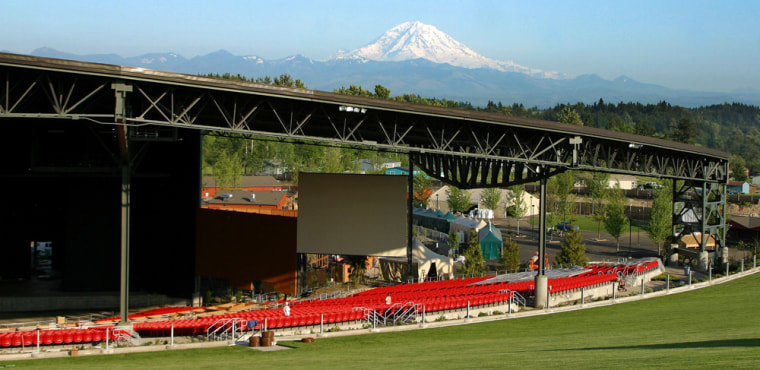Past the fireworks stands plastered with colorful flags and homemade murals, down the road from the backhoe working on a new smoke shop, the Muckleshoot Indian Tribe has staked out its corner in the next generation of American Indian business.
It's the White River Amphitheatre, a 20,000-seat concert venue owned by the tribe and managed by Clear Channel, the world's largest producer of concerts and other live-entertainment events.
The arena is an example of the private partnerships that have blossomed across Indian Country as tribes pour their casino cash into more diverse businesses at a time when their gambling revenues are increasingly threatened by both competition and political opposition.
Inspired by the popularity of the Gorge Amphitheater in eastern Washington, Muckleshoot leaders figured they could draw concertgoers to an outdoor arena closer to the city. So they waded through a seven-year government permit process and transformed a horse pasture into a modern concert venue.
With its third season just starting, officials won't reveal numbers, but say the $30 million amphitheatre is a success, drawing acts including Snoop Dogg, Ozzy Osbourne and Reba McEntire.
"A lot of private entities would have given up," said Rollin Fatland, a consultant to the tribe and promoter. "But the tribe hung in there and did everything right, and now they've got a first-class facility."
Across Indian Country, new tribal enterprises range from high finance and tourism to agriculture and food processing, including banks in California and Montana, a $43 million Washington, D.C. hotel owned by four tribes from Wisconsin and California, and a fruit juice plant purchased last year by the Yakama Nation of eastern Washington.
"The majority of us are focusing in on trying to diversify and trying to develop those foundations before the gaming revenue disappears," said Ron Allen, chairman of the Jamestown S'Klallam tribe and past president of the National Congress of American Indians.
The explosive growth of Indian casino gambling has profits rolling in for many tribes — more than 400 casinos in 28 states earned some $18.5 billion last year. But it also has them feeling the heat from political critics and the non-Indian gambling industry, which is angling for access to the lucrative slot machines that are reserved for tribes in many states.
Washington, for example, was one of a half-dozen states that had gambling-related measures on the statewide ballot last year aimed at weakening tribal monopolies on gambling.
"Tribal economic diversification arises in part from the recognition that Indian gaming would sink or swim depending on the ever-changing political winds," said Gabe Galanda, a Seattle attorney who specializes in Indian issues.
Comprehensive data on tribal business isn't available, but recent years have seen tribes with gambling follow a trend of adding tourist-based businesses that add to the draw of their casinos, said Jonathan Taylor, a research fellow with the Harvard Project on American Indian Economic Development.
Some tribes, Taylor said, also are moving to a second tier of businesses that aren't tourist attractions, including retail, light manufacturing and defense contracting.
"They really run the gamut from convenience stores all the way up to sophisticated lease agreements," he said.
One example well known throughout Indian Country, Taylor said, is Quil Ceda Village, a retail center operated by the Tulalip Tribe near Marysville, north of Seattle.
The center is unique because of its status as a federally recognized municipality — "There's only one other one, and it's Washington, D.C.," Taylor said.
Quil Ceda recently became host to a string of high-end outlet stores operated by Chelsea Property Group, and officials estimate the new venture will bring about 800 jobs and a payroll of some $15 million to the area. The tribe also is planning a new performance venue and hotel.
Along the way, they've seen a learning curve for non-Indian businesses dealing with tribal governments, whose decision-making processes may seem slow and arcane to outsiders, said John McCoy, the village's manager.
"Whenever you mention 'Indian,' people's eyes roll back in their heads," McCoy said. "But it isn't rocket science."
But cultural differences aren't always a stumbling block, Fatland said.
"The biggest difference from my perspective is that the tribe has got a lot longer perspective of stuff. They're not focused on the next quarter, they're focused on the next generation, and it makes a big difference in how they approach things," he said.
